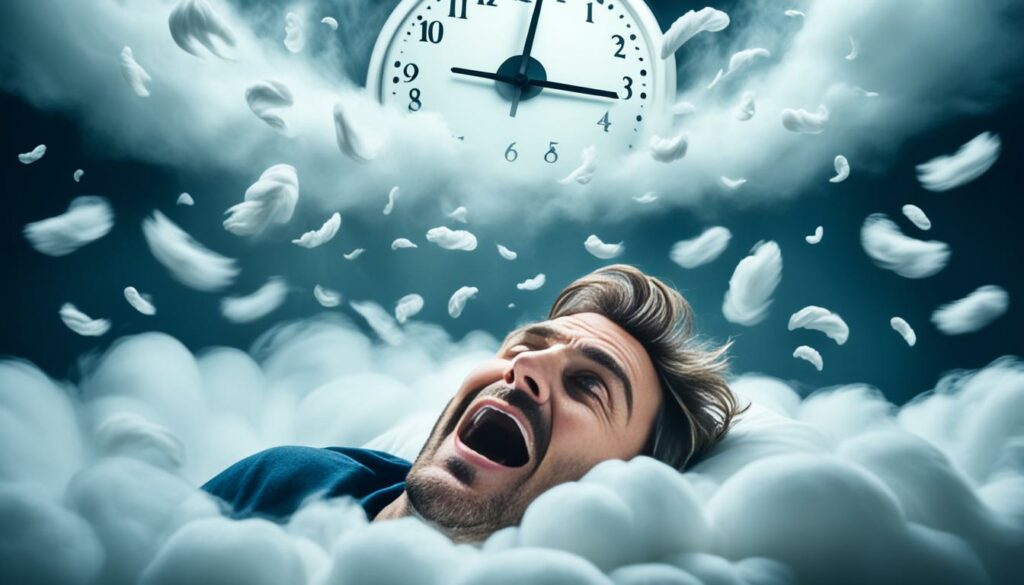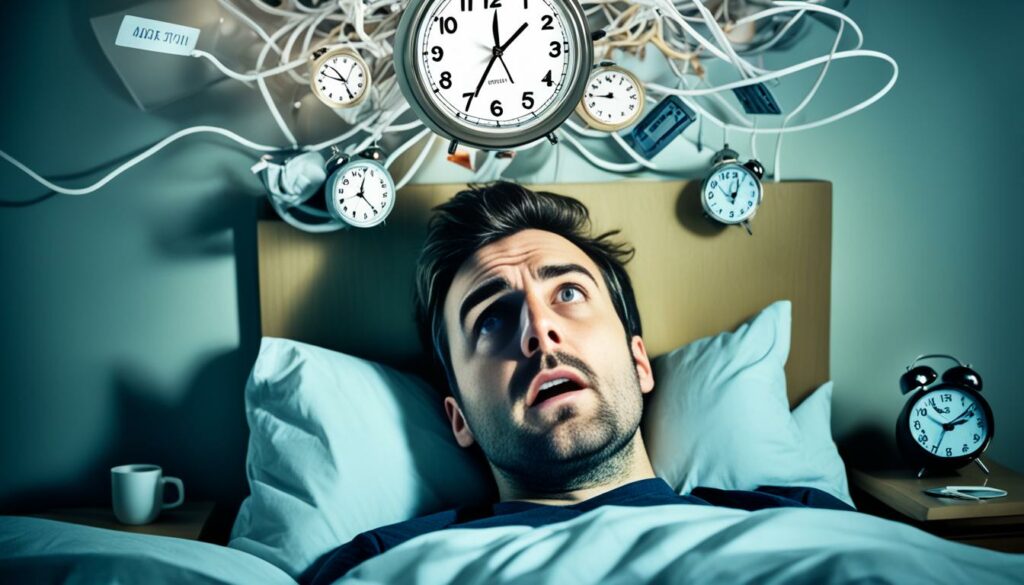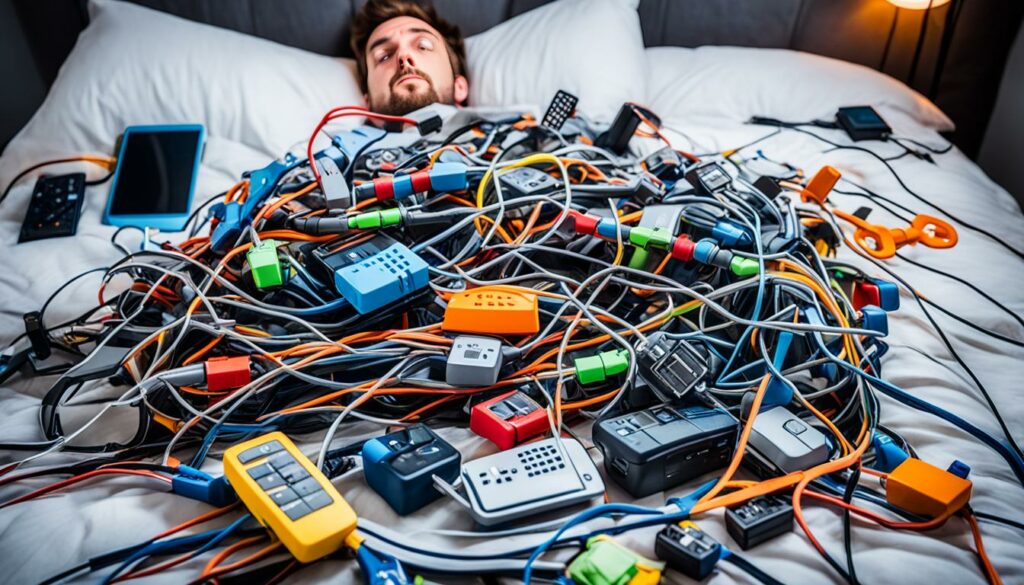Did you know that approximately 70% of individuals with ADHD experience sleep problems?
ADHD, or Attention-Deficit/Hyperactivity Disorder, is a common neurodevelopmental condition that affects both children and adults. While ADHD is primarily known for its impact on attention, focus, and impulsivity, it is also closely linked to sleep issues, particularly insomnia.
Individuals with ADHD often struggle with falling asleep, staying asleep, and having a restful night’s rest. Sleep disruptions, nightmares, and a delayed circadian rhythm are common challenges for people with ADHD. These sleep problems can have a profound impact on their daily lives, affecting mood, cognitive function, and overall well-being.
While medication can help manage ADHD symptoms, addressing sleep issues requires a holistic approach that combines behavioral changes, lifestyle modifications, and effective sleep management strategies.
Key Takeaways:
- ADHD is associated with a high prevalence of sleep problems, particularly insomnia.
- Sleep disruptions in individuals with ADHD can lead to mood swings, cognitive difficulties, and reduced quality of life.
- A comprehensive approach to managing ADHD-related sleep issues involves behavioral changes, lifestyle modifications, and adherence to sleep hygiene practices.
- Establishing a regular sleep routine and creating a sleep-friendly environment can promote better sleep in individuals with ADHD.
- Consulting with healthcare professionals is essential for effective management of ADHD-related sleep problems.
Understanding the Connection Between ADHD and Sleep
ADHD, or Attention Deficit Hyperactivity Disorder, can have a significant impact on sleep patterns. People with ADHD often struggle with falling asleep, staying asleep, and achieving a restful night’s sleep. These sleep problems can vary depending on the type of ADHD, with inattentive symptoms associated with delayed bedtimes and hyperactive-impulsive symptoms linked to insomnia. The impaired regulation of brain activity in ADHD can disrupt sleep patterns, arousal, alertness, and regulation circuits in the brain, contributing to sleep difficulties.
While some individuals with ADHD may find that stimulant medications have a calming effect and aid in sleep, others may experience the opposite effect. Sleep patterns in ADHD can also be influenced by other factors such as anxiety, depression, or coexisting conditions. It is important for individuals with ADHD to understand the connection between their diagnosis and sleep problems in order to effectively manage their sleep issues.
Table: Common Sleep Problems in ADHD
| Sleep Problem | Description |
|---|---|
| Difficulty falling asleep | Individuals with ADHD may have trouble initiating sleep, leading to longer sleep onset times. |
| Difficulty staying asleep | Frequent awakenings during the night can disrupt sleep continuity and reduce overall sleep quality. |
| Restless sleep | People with ADHD may experience restless and agitated sleep, often accompanied by movement or tossing and turning. |
| Irregular sleep patterns | ADHD can disrupt the circadian rhythm, causing irregular sleep patterns and a misalignment between sleep and wake times. |
Impact on Daily Functioning
The sleep problems associated with ADHD can have a significant impact on daily life. Sleep deprivation can result in daytime sleepiness and fatigue, which can affect concentration, memory, and overall productivity. Mood swings, irritability, and behavioral difficulties are also common consequences of inadequate sleep. In children with ADHD, sleep problems can contribute to hyperactive and impulsive behaviors, making it challenging to manage symptoms effectively.
In addition to the direct impact on individuals with ADHD, sleep problems can also affect their families and caregivers. High levels of stress and compromised well-being can arise from providing care to a loved one with disrupted sleep, highlighting the need for effective management strategies to improve sleep quality for everyone involved.
“Sleep is the golden chain that ties health and our bodies together.” – Thomas Dekker
Common Sleep Disorders in ADHD
People with ADHD often experience sleep disorders that can further worsen their sleep quality and overall well-being. Understanding these common sleep disorders is crucial for effectively managing ADHD-related sleep issues. The most prevalent sleep disorders in individuals with ADHD include:
- Insomnia: Insomnia is a sleep disorder characterized by difficulty falling asleep, staying asleep, or experiencing non-restorative sleep. In ADHD, insomnia can be caused by racing thoughts and a delayed onset of melatonin production.
- Circadian Rhythm Sleep Disorders: Individuals with ADHD may also experience disruptions in their sleep-wake cycle, resulting in difficulties in falling asleep and maintaining a consistent sleep schedule.
- Sleep-Disordered Breathing: Sleep-disordered breathing disorders, such as sleep apnea, can be more prevalent in individuals with ADHD. These disorders can cause pauses in breathing during sleep, leading to disturbed sleep and excessive daytime sleepiness.
- Restless Legs Syndrome (RLS): RLS is a condition characterized by an uncomfortable sensation in the legs and an irresistible urge to move them. Individuals with ADHD may be at a higher risk of experiencing RLS, which can significantly interfere with falling asleep and maintaining restful sleep.

To better understand the prevalence of these sleep disorders in individuals with ADHD, refer to the following table:
| Sleep Disorder | Prevalence in ADHD |
|---|---|
| Insomnia | 50-70% |
| Circadian Rhythm Sleep Disorders | 30-40% |
| Sleep-Disordered Breathing (e.g., sleep apnea) | 25-30% |
| Restless Legs Syndrome (RLS) | 15-25% |
It is important to note that these percentages may vary depending on individual factors and research studies. If you suspect that you or someone you know may have any of these sleep disorders, it is recommended to consult with a healthcare professional for an accurate diagnosis and appropriate treatment plan.
The Impact of ADHD Sleep Problems
Sleep problems in individuals with ADHD can have a profound impact on their daily functioning. The persistent challenges associated with daytime sleepiness and fatigue can significantly hamper concentration, memory, and overall productivity. People experiencing sleep deprivation due to ADHD often endure mood swings, irritability, and behavioral difficulties, further exacerbating the impact the condition has on their lives.
For children, sleep problems can contribute to hyperactive and impulsive behaviors, making it even more challenging for them to excel academically and socially. Furthermore, the impact of ADHD-related sleep problems extends beyond the individuals themselves, affecting their families and caregivers who may experience increased stress and negative effects on their own well-being.

| Effects of ADHD Sleep Problems | Impact |
|---|---|
| Daytime sleepiness | Difficulty concentrating and decreased productivity |
| Fatigue | Impaired memory and cognitive function |
| Mood swings | Irritability and emotional instability |
| Behavioral difficulties | Challenges in managing impulsivity and hyperactivity |
| Impact on families | Increased stress and negative effects on well-being |
To address the far-reaching consequences of ADHD sleep problems, it is crucial to develop effective strategies for managing and improving sleep quality in individuals with ADHD. Implementing a consistent bedtime routine, creating a sleep-friendly environment, and avoiding stimulating activities close to bedtime can all contribute to better sleep. It is also important to consult with healthcare professionals to explore treatment options that may help address sleep difficulties.
Additionally, addressing any coexisting conditions, such as anxiety or depression, can have a positive impact on sleep quality. By taking a comprehensive approach to managing ADHD-related sleep issues, individuals with ADHD can experience improved sleep and enhanced overall quality of life.
Strategies for Managing ADHD-related Sleep Issues
Individuals with ADHD often face challenges when it comes to getting a good night’s sleep. However, there are several strategies that can help improve sleep management and overall sleep quality for those with ADHD.
Establish a Regular Bedtime Routine
Creating a consistent bedtime routine can signal the body to prepare for sleep. Try to go to bed and wake up at the same time every day, even on weekends. Engage in calming activities before bed, such as reading a book, taking a warm bath, or practicing relaxation techniques like deep breathing or meditation.
Avoid Stimulating Activities, Screens, and Caffeine
Close to bedtime, it’s important to limit stimulating activities that can interfere with relaxation and sleep. Avoid using electronic devices, such as smartphones, tablets, or computers, as the blue light emitted can disrupt the natural sleep-wake cycle. Additionally, avoid consuming caffeine in the evening, as it can interfere with falling asleep.
Create a Sleep-Friendly Environment
A comfortable sleep environment can greatly contribute to better sleep. Ensure your bed and pillows are comfortable and supportive. Keep your bedroom cool, quiet, and dark, using curtains, blinds, or an eye mask to block out any excess light. Consider using white noise machines or earplugs to mask any background noise that might disrupt your sleep.
Consult with a Healthcare Professional
If you’re considering medication for managing ADHD, it’s important to consult with a healthcare professional who can provide guidance and monitor its effects on your sleep patterns. Some medications may have an impact on sleep, so it’s crucial to find the right balance between managing ADHD symptoms and maintaining healthy sleep habits.
Address Coexisting Conditions
Individuals with ADHD often experience coexisting conditions, such as anxiety or depression, which can further impact sleep quality. Seeking appropriate treatment for these conditions can help improve sleep and overall well-being. Cognitive-behavioral therapy (CBT) can be particularly helpful in addressing both ADHD and sleep problems.
To enhance sleep management and improve sleep quality, it’s essential to adopt a comprehensive approach that incorporates these strategies. By establishing a regular bedtime routine, avoiding stimulating activities before bed, creating a sleep-friendly environment, consulting with a healthcare professional, and addressing any coexisting conditions, individuals with ADHD can take significant steps towards improving their sleep and overall quality of life.

| Strategies for Managing ADHD-related Sleep Issues |
|---|
| Establish a regular bedtime routine |
| Avoid stimulating activities, screens, and caffeine close to bedtime |
| Create a sleep-friendly environment |
| Consult with a healthcare professional |
| Address coexisting conditions |
Conclusion
Sleep problems are a common challenge for individuals with ADHD, and their impact on overall well-being should not be underestimated. Understanding the connection between ADHD and sleep disorders is crucial for effective management. By implementing strategies to improve sleep hygiene and seeking appropriate treatment, individuals with ADHD can experience better sleep and a significant enhancement in their quality of life.
Working closely with healthcare professionals is essential in developing a comprehensive approach to managing ADHD-related sleep issues. Professionals can provide guidance on medication options, if necessary, and help address any underlying conditions, such as anxiety or depression, that may be contributing to sleep difficulties in individuals with ADHD.
By prioritizing sleep hygiene, establishing consistent bedtime routines, creating sleep-friendly environments, and avoiding stimulants before bedtime, individuals with ADHD can set themselves up for better sleep and improved daily functioning. Remember, the journey to better sleep may require patience and experimentation to find the strategies that work best for each individual.
